《高山流水》赵天汲
High Mountain, Flowing Water by ZHAO Tianji
(声音装置 / sound installation)
《高山流水》赵天汲
High Mountain, Flowing Water by ZHAO Tianji
(声音装置 / sound installation)
 时间 posted on: 2 February 2013 |
时间 posted on: 2 February 2013 |  发布者 author: michael eddy |
发布者 author: michael eddy |  评论 comment (0) |
评论 comment (0) |
茶壶里生长“最北端的Mojito
壶里的土来自漠河,中国的最北端
王尘尘
northernmost mojito in the teapot
with earth from Mohe, China’s northernmost point
by Wang Chenchen
 时间 posted on: 31 July 2012 |
时间 posted on: 31 July 2012 |  发布者 author: michael eddy |
发布者 author: michael eddy |  评论 comment (0) |
评论 comment (0) |
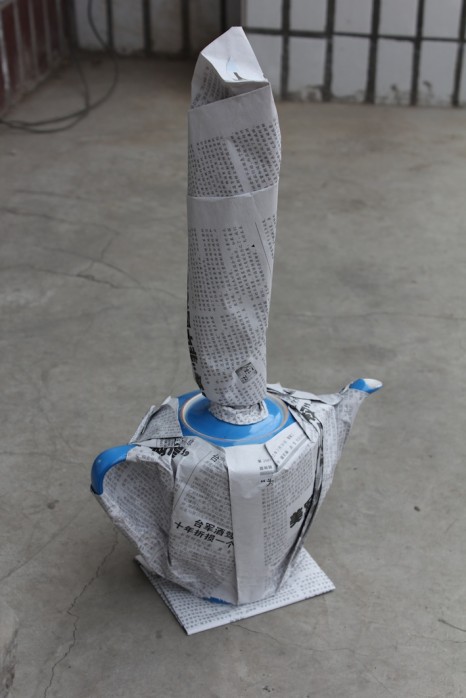
中国报道 (2012.03.20)
老羊制作/by Lao Yang
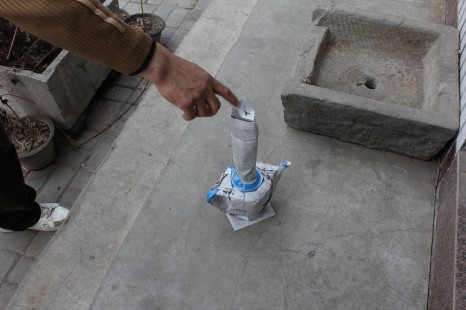
 时间 posted on: 26 March 2012 |
时间 posted on: 26 March 2012 |  发布者 author: michael eddy |
发布者 author: michael eddy |  评论 comment (0) |
评论 comment (0) |
在中国,农历正月初五“接财神”的习俗,盛行于明清民国,迄今犹流传民间。传说中有六位财神掌管人间财物。
1.正财神:赵公明,掌管招宝、纳珍、招财、利市。
2.文财神:范蠡,掌管人间财帛、人世爵位。
3.武财神:关羽,忠诚信义,保护财产。
4.偏财神:刘海蟾,撒钱济贫。
5.南海财神:龙五爷,降瘟除魔。
6.晋商:白圭,治生之祖。
按抽签的方式,初五这天高灵请到了“正财神赵公明”到家作坊, 尘尘请到了“晋商白圭”到家作坊,WB请到了“文财神”到家作坊,CYK请到了“武财神”到家作坊。各路财神各显神通,大家祝福家作坊在新的一年里财源广进!
“Welcoming the Gods of Wealth on the Fifth Day”
In China there is a custom of welcoming the God of Wealth on the fifth day of the first Month on the lunar calendar. It was popular in the Ming and Qing Dynasties, as well as in the Republic of China, and it is still widely practiced in folk traditions. Legend has it, there are six gods in charge of earthly prosperity.
1. Central God of Wealth: Zhao Gongming, in charge of attracting abundance of treasures, riches, valuables and money.
2. Civil God of Wealth: Fan Li, in charge of luxuries and positions of nobility.
3. Military God of Wealth: Guan Yu, loyal and faithful, protecting people’s prosperity.
4. Off-Center God of Wealth: Liu Haichan, spreading money to the poor.
5. South Sea God of Wealth: Long Wuye, casting out diseases and ghosts.
6. Shanxi Merchant: Bai Gui, governing the laws of commerce.
Drawing lots, in the 5th day of the first month, Gao Ling invited the Central God of Wealth to HomeShop, CC invited the Shanxi Merchant to HomeShop. WB ushered in the Civil God of Wealth, and CYK summoned the Military God of Wealth. Everyone supplicated to the gods to work effectively to attract a bounty of financial resources in the new year!
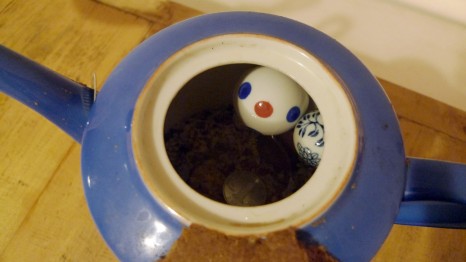
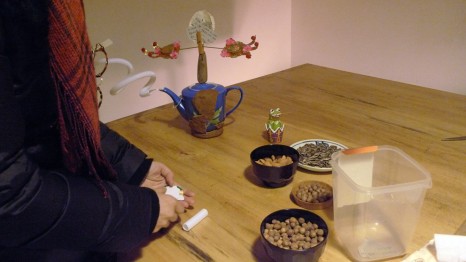
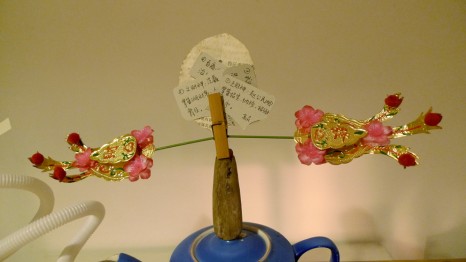
 时间 posted on: 5 March 2012 |
时间 posted on: 5 March 2012 |  发布者 author: michael eddy |
发布者 author: michael eddy |  评论 comment (0) |
评论 comment (0) |
第六届茶壶展览 * Teapot exhibition 6 | Pilar ESCUDER
由Pilar Escuder和Fotini Lazaridou-Hatzigoga表演的茶道仪式
A tea ceremony with Pilar ESCUDER and Fotini LAZARIDOU-HATZIGOGA
 时间 posted on: 3 August 2011 |
时间 posted on: 3 August 2011 |  发布者 author: michael eddy |
发布者 author: michael eddy |  comments (2) |
comments (2) |
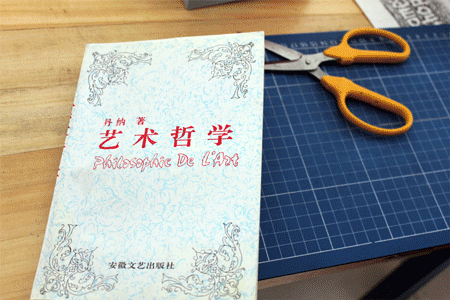
一个茶壶,因为过时而被丢弃。
一个艺术家把它捡来,不小心又把盖儿上的把手摔掉了。于是他用一个废旧的锥子把按在盖儿上做把手,之后又不断在锥子把上放上他的新展品…
这次他从一个人正在读的一本书中剪下来最重要的部分,这部分来自读者认为最重要的几页书,剪下来的部分呈自然的树叶形,很好看…,
这部分读者还没看,等他读到这部分的时候,他会到那个被丢弃的茶壶上的那个被丢弃的锥子把上去找那新长出来的几片新树叶…
孔子云:“何陋之有?”
A teapot was abandoned for being out of fashion. An artist adopted it but broke the knob on its lid. He replaced it with the handle of a disused awl, which formed a stage of continuous, temporary displays…
In this 5th edition, a reader was invited to select a book he had just started. The reader found a section he hadn’t read, but that he believed to be important, and cut it out to display on the teapot.
Upon seeing the result, the reader said: “They look like leaves in nature, very nice…”
When he reaches this section, the reader will find the newly grown leaves on the top of a disused awl handle on the top of the abandoned teapot.
Confucius once said: “How could we call a room humble as long as there is a virtuous and wise man in it?”
– Michael EDDY and 曲一箴 QU Yizhen.
 时间 posted on: 30 March 2011 |
时间 posted on: 30 March 2011 |  发布者 author: michael eddy |
发布者 author: michael eddy |  评论 comment (0) |
评论 comment (0) |